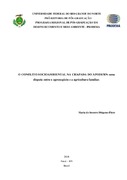Please use this identifier to cite or link to this item:
https://repositorio.ufrn.br/handle/123456789/25520| Title: | O conflito socioambiental na chapada do Apodi/RN: uma disputa entre o agronegócio e a agricultura familiar |
| Other Titles: | The socioenvironmental conflict in the Apodi/RN tableland: a dispute between agribusiness and family agriculture |
| Authors: | Pinto, Maria do Socorro Diógenes |
| Advisor: | Miller, Francisca de Souza |
| Keywords: | Agricultura familiar;Agronegócio;Resistência;Território;Água |
| Issue Date: | 19-Feb-2018 |
| Citation: | PINTO, Maria do Socorro Diógenes. O conflito socioambiental na chapada do Apodi/RN: uma disputa entre o agronegócio e a agricultura familiar. 2018. 111f. Dissertação (Mestrado em Desenvolvimento e Meio Ambiente) - Centro de Biociências, Universidade Federal do Rio Grande do Norte, Natal, 2018. |
| Portuguese Abstract: | A pesquisa apresentada nessa dissertação aborda o conflito socioambiental desenvolvido na Chapada do Apodi, estado do Rio Grande do Norte. O referido conflito surge a partir da resistência dos agricultores da Chapada do Apodi contra a implantação do Perímetro Irrigado Santa Cruz do Apodi, através do Departamento Nacional de Obras Contra a Seca – DNOCS. Desse modo, tem como objetivo geral analisar o conflito socioambiental desenvolvido na Chapada do Apodi/RN e suas consequências. Para tanto, parte dos seguintes objetivos específicos: investigar os fatores que contribuíram para o desenvolvimento desse conflito socioambiental; identificar os atores sociais e recursos ambientais envolvidos; identificar os interesses e reivindicações do Movimento de Resistência com relação aos recursos naturais e ao território; verificar se houve alguma violação aos direitos dos agricultores e ao meio ambiente, em virtude da implantação do perímetro irrigado. Os procedimentos metodológicos utilizados foram a pesquisa documental, por meio da qual foram analisados documentos referentes ao perímetro irrigado e ao Movimento de Resistência, e a pesquisa de campo, através de entrevistas, abertas e semiestruturadas, por amostragem, com os atores sociais envolvidos. A análise de dados demonstrou que esse conflito socioambiental possui dimensões políticas, sociais, jurídicas e ambientais, e que além de representar uma disputa entre dois modelos de produção agrícola, a agricultura familiar de base agroecologia e o agronegócio, compreende também uma luta pela defesa daquele território e a garantia do direito à agua, algo que acaba gerando reflexos em âmbito estadual, tendo em vista os fins a que são destinados os recursos hídricos da Barragem de Santa Cruz e do Aquífero Jandaíra. Além disso, evidenciou a necessidade de se iniciar uma discussão sobre o direito ao território social, ou seja, o direito dos povos e comunidades que mantém relações de afetividade com o espaço onde vivem, de permanecerem nesse ambiente biofísico, haja vista a simbologia, tradição e memória coletiva que esse lugar possui. Nesse sentido, percebeu-se que a implantação de grandes projetos tende a ocasionar conflitos e violações de direitos, que poderiam a vir ser, pelo menos, minimizados a partir da consulta prévia e participação social. |
| Abstract: | The research presented in this dissertation aboard the socio-environmental conflict developed in the Apodi Tableland, Rio Grande do Norte state. This conflict start from the resistance of the farmers in the tableland of Apodi against the implantation of the Irrigate Perimeter of Santa Cruz do Apodi, through the National Department of works against the drought. In This way, has as general objective analyze the socio-environmental developed in the Tableland of Apodi, Rio Grande do Norte state and his consequences. For so, part of the follow specific objective: investigate the factors that contribute to the development of this conflict; identify the social actors and the environmental resource involved; identify the interest and claims of de Resistance Movement in relation with the natural resource and to the territory; verify if has been any violation to the Rights of the farmers and of the environment, in virtue of the implantation of the irrigate perimeter. The methodological procedures used were the documentary research, through were analyzed documents referring to the irrigated perimeter and the Resistance Movement, and the field research, through open and semi-structured interviews by sampling the social actors involved. The data analysis demonstrate that this socio-environmental conflict possess social, political, juridical and environmental dimension, and more than represent a dispute between two model of agricultural production, the agroecological family agriculture and the agribusiness, comprehend so the fight for the defense of that territory and the warranty of the Right to the water, something that ends generate reflex in the state base, considering the purposes for which the water resources of the Santa Cruz Dam and the Jandaíra Aquifer are destined. Also has been noticed the necessity of start a debate about the Right to the social territory, in other words, the Right of the people and community that keep relation of affectivity with the space where their live, of to stay in this biophysical environment, given the symbolism, tradition and collective memory that this place possesses. In this sense, it was noticed that the implantation of big projects tends to cause conflicts and violations of Rights which could be minimized through the preview consultation and social participation. |
| URI: | https://repositorio.ufrn.br/jspui/handle/123456789/25520 |
| Appears in Collections: | PRODEMA - Mestrado em Desenvolvimento e Meio Ambiente |
Files in This Item:
| File | Description | Size | Format | |
|---|---|---|---|---|
| MariaDoSocorroDiogenesPinto_DISSERT.pdf | 1,73 MB | Adobe PDF |  View/Open |
Items in DSpace are protected by copyright, with all rights reserved, unless otherwise indicated.

